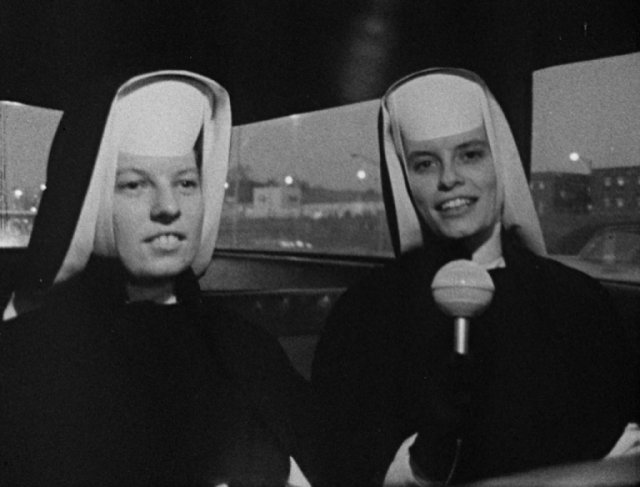Inquiring Nuns
Directed by Gordon Quinn & Jerry Temaner, Music by Philip Glass

US, 1968, 66 min, in English
One of the earliest examples of Kartemquin co-founders Gordon Quinn and Gerald Temaner’s exploration into the world of cinéma vérité, Inquiring Nuns captures the attitudes, fears, and dreams of everyday Chicagoans, giving audiences and researchers insight into the political and social climate of 1960’s Chicago. The film’s music is composed by Philip Glass in his first credited film score.
Two young Catholic nuns crisscross Chicago, from a supermarket to the Art Institute to church on Sunday, in order to ask random strangers the question, "Are you happy?"
The answers include:
"Groovy!"
"I could be happier."
"Mostly, except about Vietnam."
"Well, certainly, Notre Dame won yesterday!"
"Yeah, because I went to communion this morning."
They meet a lonely girl, a happy mother, young lovers, hippie musicians, a sociologist, and even the actor Lincoln Perry, better known as Stepin Fetchit. The interviewees are sometimes taken aback, nervous, or clamoring to get into view of the camera. The humor and pathos of these encounters elevates the film into a serious and moving inquiry of contemporary society and the manner which people examine their own lives.
Press
Sisters do a documentary for themselves Phil Hoad, The GuardianA soothing balm for our age of 24/7 online hate
Paul Weideman, Santa Fe New MexicanA priceless and engaging document
‘Inquiring Nuns’ holds a mirror to 1967 Chicago, and to ourselves today Neil Steinberg, Chicago Sun TimesA charming time-capsule
Happiness is an Inquiring Nun Meg Shields, NonFicsstrikingly honest meditation on the complexities of well-being and the importance of connecting with other people.
A simple question yields many profound answers Glenn Kenny, The New York TimesA thought-provoking time capsule
William Routt, Film Quarterly, 1968Inquiring Nuns is the closest thing to a 'pure' documentary that I have ever seen.
Michael Phillips, Chicago Tribune, 2016A lovely, weirdly potent time capsule... a single, polyphonic ode to late '67 Chicago and what was on the mind of its collective citizenry.
Roger Ebert, Chicago Sun-Times, 1968Quinn and Temaner are filmmakers and "inquiring reporters" with great insight, and a lot to tell us about ourselves.
Matt Fagerholm, RogerEbert.com, 2016A provocative meditation on the complexities of happiness as well as a moving ode to the vitality of human connection. It serves as a refreshing rebuke to our modern political climate favoring bullying and division over understanding and unity.
Richard Christiansen, Chicago Daily News, 1968Handled with such surpassing understanding that it becomes a quite profound and moving experience for the viewer… a marvelous revelation of our time and ourselves.